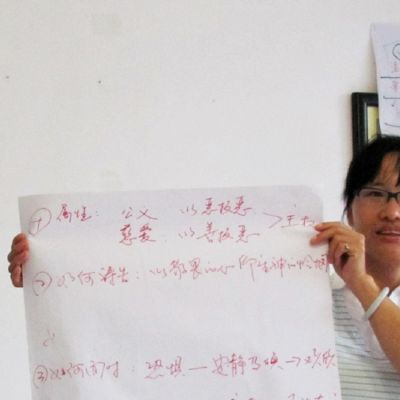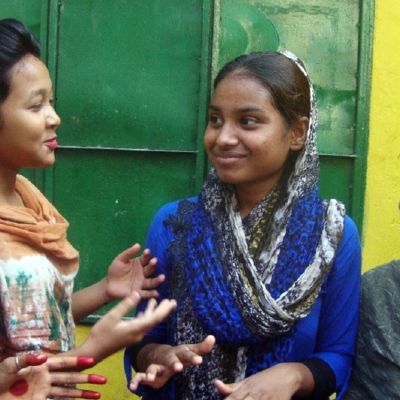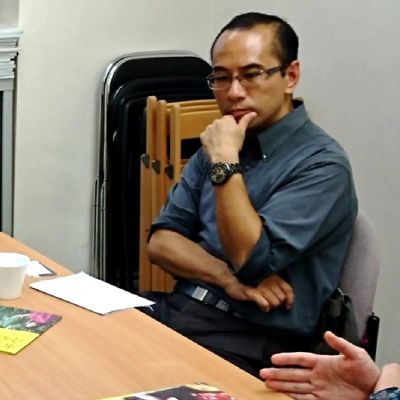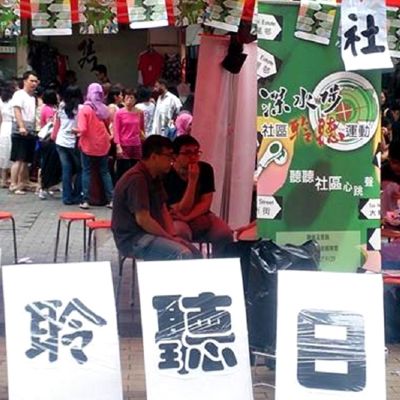Written and edited by: Tsun Wan Yan
The Church’s role in Hong Kong’s social development dates back to early missionary times. However, in recent years, churches in Hong Kong were often accused of being absent from major social discussions, except issues that spiked its interest. For this issue’s “TAKING ACTION” section, we interviewed the Organiser of the social organisation, HK Citizens, Daniel Man, and asked him how they mobilise churches to respond to current issues through Community Organising.
The Beginning: Non-profit Work in England
HK Citizens oragnises community to work together for common good, which involves mobilising churches to bond with their communities. And this is not something new to Daniel.
Daniel started off as a social worker in Hong Kong; in 2010, he and his wife, Joy, had a chance to participate in Community Organising work in the UK. In one occasion, he experienced how people of different religions, such as Catholics, Christians, and Muslims, could cooperate with each other in an event. Similar events in Hong Kong usually involved religious leaders but not common believers. There were also little opportunities for people of different race, background, and age to interact. That experience got him thinking if Hong Kong could become a true multi-cultural society that embrace diversity.
After they returned to Hong Kong, Daniel and Joy wanted to bring different groups together to serve the community under the concept of cross-sector cooperation, hence, HK Citizens was born. Daniel was fully aware that it takes time for his dreams to come true, but he was never discouraged, “I wish to bring forth the idea of common good among people that we can all work towards a better society together despite our differences.”
Reflection: Going into the World
Daniel has been a Christian since secondary school. Even though he still believed in God in his university years, he slowly distanced himself from the church, as he felt that the church failed to connect with the society. Then, after he returned from the UK, he realised that criticising the shortcomings of the church would make little difference, so he decided to use his identity as both a social worker and a Christian to mobilise churches through his current work. But he admitted that this is a difficult task.
“We wish that the Church would not just limit itself to benevolent work,” said Daniel, who expressed that many churches participate in social services, but lack knowledge about their surrounding communities, hindering them to address the core of social problems. Community Listening is HK Citizens’ main approach to help make community members’ voices be heard, so everyone can learn about social problems the community is facing, and identify causes of the problems, then work out solutions.
Daniel shared a case about a partnering church. The visually impaired make up a big part of the community where that church is located. Many visually impaired people walked pass the church’s parking lot exit regularly, but there were no guide paths to indicate the structure, thus creating difficulties for the visually impaired to beware of cars coming out of the parking lot. Daniel encouraged the church to take a step further to bring the request of the visually impaired to the district councilor. Recently, the church met with the visually impaired for the first time and listened to their needs to talk about how the church could help. Though nothing has set in stone yet, the brothers and sisters of that church had taken a precious first step in walking with the ones in need. “This had greatly strengthened the bonding between the church and its neighbours,” said Daniel, who hoped the church would listen to different voices in the community and respond by mobilising its members to take part in caring the needy.
Back to the Basics: Unity in Church
HK Citizens not only aims to connect churches with their communities, but also encouraging closer relationship among church members.
The Church has long been criticised for its exclusiveness, but Daniel had a different view, the Church need to first unite its members – every staff and member should listen and get to know each other. He shared a case that a pastor hosted a listening session after the church’s Sunday service to gather feedback. Brothers and sisters liked the novel idea since it provided a platform for them to hear from others and enjoy cross-fellowship interactions. “After the session, a sister said it was her first time to hear from an elderly, whom she sees every Sunday, to share about how he spends his day by just sitting on a bench at the park. Even though she saw him weekly, she never knew anything about him.”
Daniel said that the interactions between church members are often administrative and superficial, where brothers and sisters may not know the real needs of each other. He hoped that HK Citizen’s events can encourage Christians to listen and care for each other in church, equipping them to eventually serve their communities.
The Future: A Democratic Life
Daniel readily admitted that mobilising community and churches is a difficult process that calls for observations and trying different approaches when searching for a breakthrough. He hoped to change how we normally react to new problems by collaborating with different groups and soliciting the help of locals for social engagements. “Individual involvement is important, but the power to change comes from collective actions,” said Daniel, determined in increasing the level of social engagement within systems.
As for the Church, Daniel stated the example of their guided tour* in Shek Kip Mei, which they wanted to help participants to learn how the Church had serve the community in the past and know that they can do the same today. Daniel believes that democracy is not just about politics and elections, but it is a lifestyle. He urged the Church to reflect on what democracy and social engagement mean, and motivate believers to start caring for and engaging in their communities, helping them to identify the root causes of social problems.
Epilogue: Learning to Listen
It is never easy to learn to listen. Daniel’s work at HK Citizens showed us the importance of interpersonal connections, which we often miss the chance to listen to the voices of others in our church, community, family, or workplace. May we humble ourselves and start connecting with those around us through genuine conversations.
*Shek Kip Mei Guided Historical Tour
Lau Shiu Hang, a social work intern of HK Citizens, hosted guided historical tours in Shek Kip Mei in June and July this year to help participants to see the picture of a civil society that was composed of social organisations, churches, community groups, and locals, and reflect with them how believers, citizens, and the Church could engage in their community today.
Content of this issue
Written and edited by: Tsun Wan Yan, Jojo Poon The act of poverty alleviation often gives the impression of aid workers carrying with them gifts of livestock and funds sponsoring children and their education to some remote villages. However, have you ever considered that the local churches are better suited in bringing continued and sustainable development and support to the people in need? To address the root causes of poverty for the poor, we must help the poor learn how to fish instead of relying on outsiders’ help. To prevent dependency on foreign aid, which would consequently hinder community growth, the average span of a development project is usually five to 10 years, and the development organisation will…
Written by: Pastor Daniel Ding During the past 10 years, the Church was able to integrate into the Chinese community through the government’s social service policy which encouraged non-profits to reach its residents. Yunnan was one of the pilot areas. Pastor Daniel Ding, Social Ministry Officer of Yunnan Christian Council, stressed that integration does not mean altering the truth we preach to fit in, but the challenge is to find a way to let our core values prevail. Pastor Ding is going to reflect on Isaac’s faithfulness described in Genesis 26:1-32 and his experiences in the Christian service scene in Yunnan, and let us see how God has always been with us as we serve our community. Isaac…
Banner image: As a peer educator, Taslima (middle) often catch up with other girls in the community to learn about issues they are facing Every individual has their rights despite their social status, age, gender, and education level. According to the United Nation’s Convention on the Rights of the Child, every child should have the rights to survive and thrive, to be protected, to participate and make their voices heard. In Bangladesh, where 90% of its population are Muslims and 10% are Hindus, the caste system plays a significant part in the lives of Bangladeshis. People are categorised into different castes, and people who belong to the lowest social status group in the caste system are the Dalits,…
Written and edited by: Tony Chan To echo this issue’s theme: Church and Community Mobilisation, we interviewed three pastors who are heavily involved in caring and serving their communities. They are Rev. Anders Chan Ming-chuen (Associate Senior Pastor of Mongkok Baptist Church), Mr. Jonathan Au (Lecturer of Christian Ministry Institute; Deacon at Kai Tak Peace Evangelical Centre), and Ms. Teo Yun-sarm (Conference Parish Worker of The Methodist Church, Hong Kong). They share their experiences in mobilising the Church to serve the community. It was an enriching conversation, touching on topics such as Gospel and social services, preaching social-related topics sermons, and advocating for justice. Though each of them had different views and approaches on social service, they all came…
Written and edited by: Tsun Wan Yan The Church’s role in Hong Kong’s social development dates back to early missionary times. However, in recent years, churches in Hong Kong were often accused of being absent from major social discussions, except issues that spiked its interest. For this issue’s “TAKING ACTION” section, we interviewed the Organiser of the social organisation, HK Citizens, Daniel Man, and asked him how they mobilise churches to respond to current issues through Community Organising. The Beginning: Non-profit Work in England HK Citizens oragnises community to work together for common good, which involves mobilising churches to bond with their communities. And this is not something new to Daniel. Daniel started off as a social worker…







